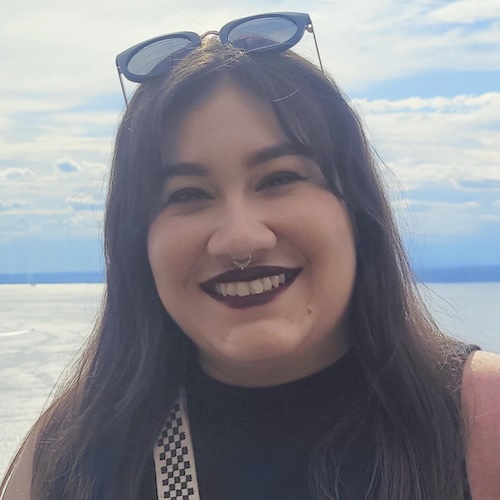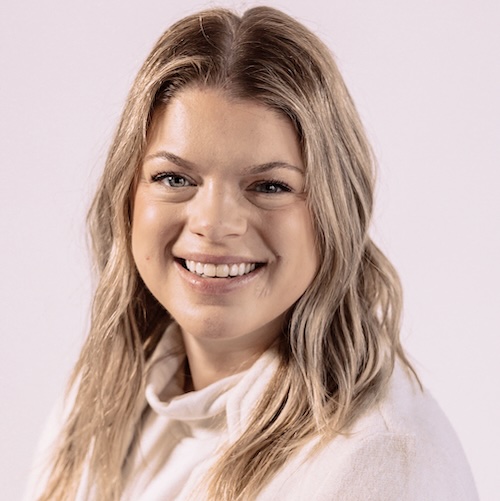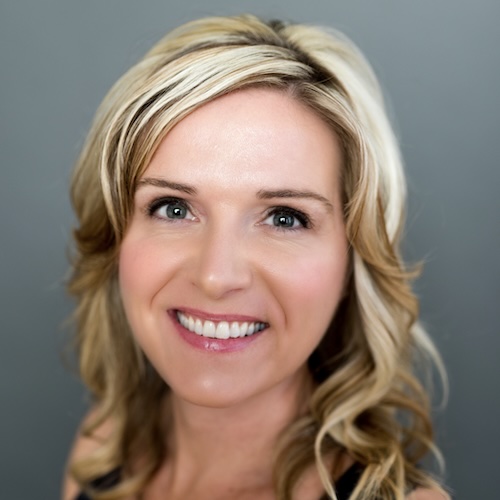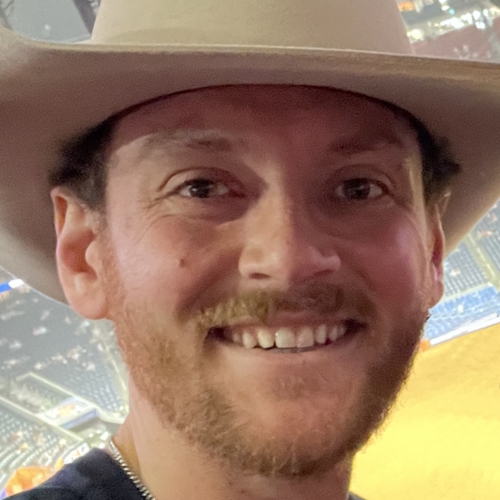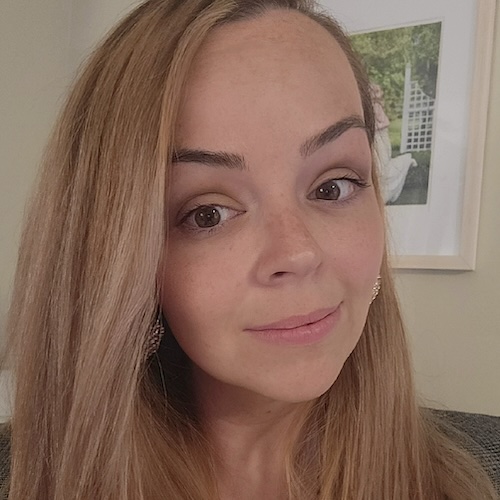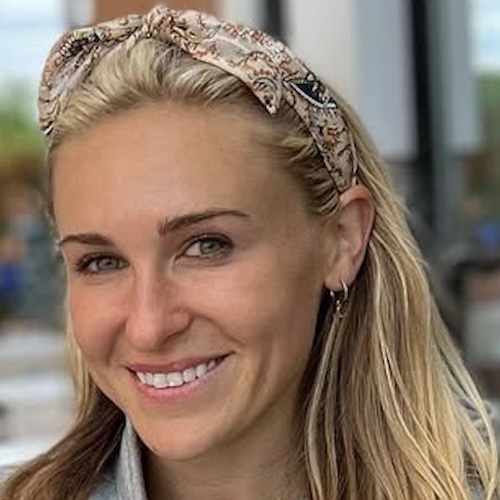Elizabeth’s Stage 4 Colon Cancer Story
Interviewed by: Taylor Scheib
Edited by: Chris Sanchez

Elizabeth was diagnosed with stage 4 colon cancer on March 14, 2019, and, after chemotherapy and surgery, was declared NED in July of the same year. On the first of July 2024, she celebrated her 5th year of being cancer–free.
Elizabeth has something of a long history of cancer, having lost her mother to non-Hodgkin lymphoma just over 4 months after she was born; having been diagnosed herself with adenocarcinoma of the submandibular salivary gland, which very rarely affects children, at just 2 years old; and having had a basal cell removed from her face at 25. She has also had a long history of stomach issues. Her colon cancer was discovered when her condition worsened to the point that a CT scan became necessary.
Elizabeth has learned a lot from her experience, and is eager to share her story with other patients in the hope that she may be able to offer both guidance and reassurance.
- Name: Elizabeth W.
- Diagnosis:
- Colon Cancer
- Staging:
- Stage 4
- Symptoms:
- Irritable bowel syndrome (IBS)
- Small intestinal bacterial overgrowth (SIBO)
- B12 deficiency
- Hypoalbuminemia
- Treatments:
- Surgery (removal of left side of liver and small portion on the right)
- Chemotherapy (oxaliplatin and xeloda)
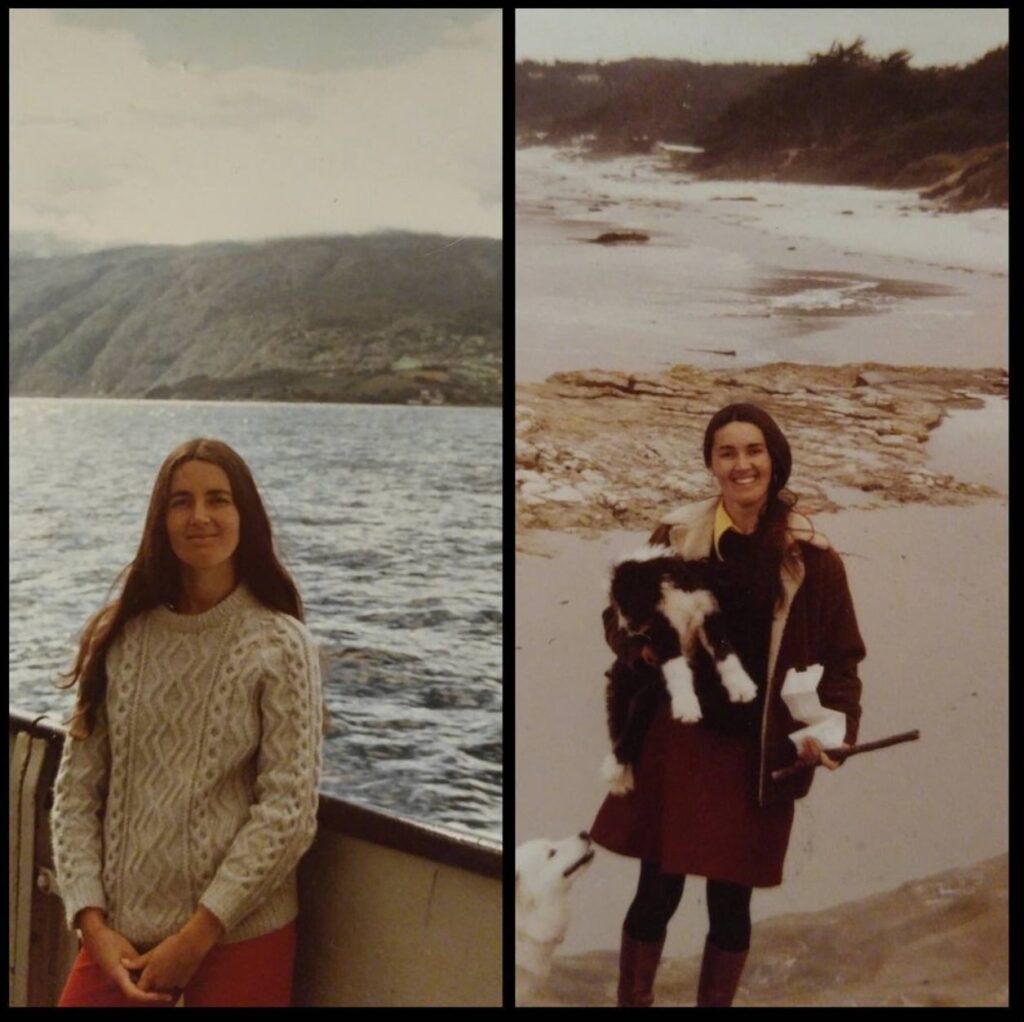
This interview has been edited for clarity and length. This is not medical advice. Please consult with your healthcare provider to make informed treatment decisions.
The views and opinions expressed in this interview do not necessarily reflect those of The Patient Story.
I’m so grateful to be able to share my story with other people who will be able to watch this and know that there is a light at the end of the tunnel, or that there are things that they can do to help themselves.
Introduction
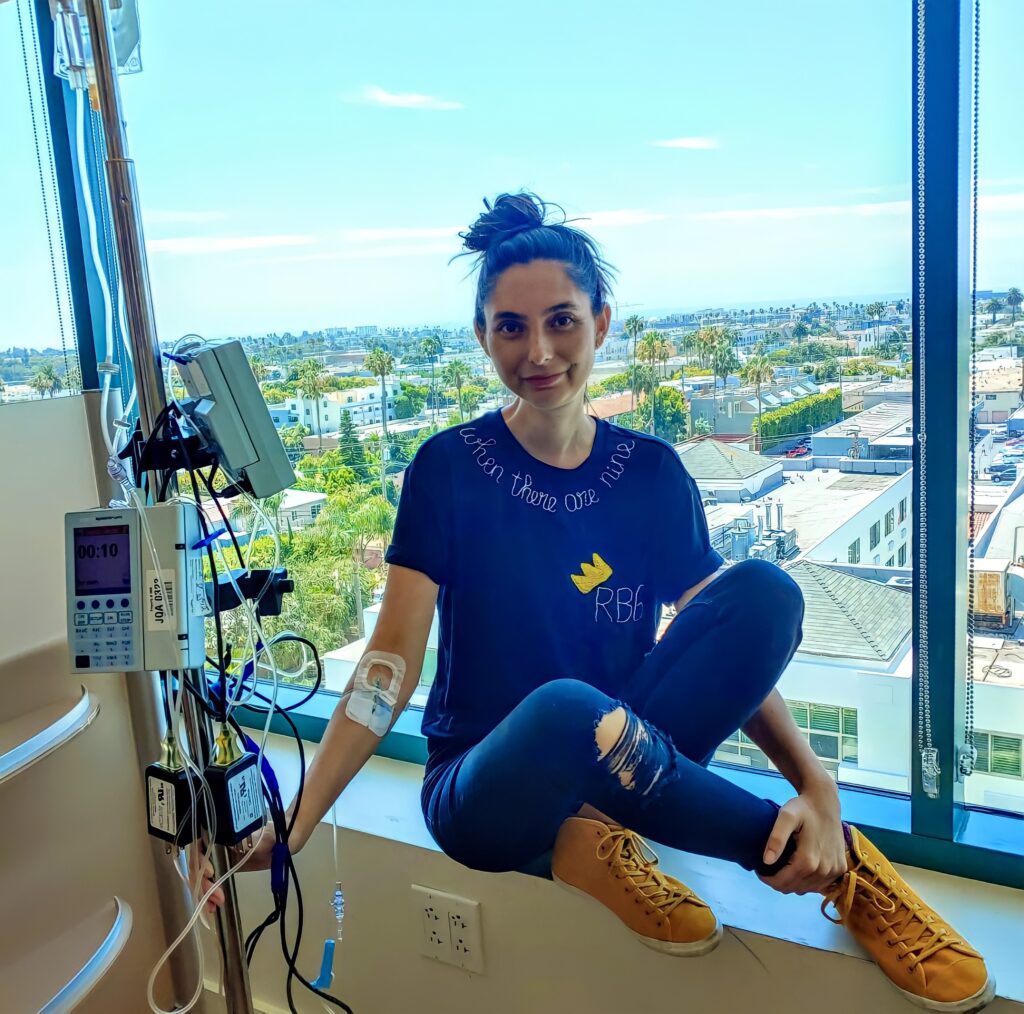
Hi, my name is Elizabeth. I work in the TV industry.
On March 14th of 2019, I was diagnosed with stage 4 colon cancer.
After surgery and chemotherapy, I was declared NED (no evidence of disease) later that same year.
On July 1st, I will have been 5 years cancer-free.
History of Cancer
I have kind of a long history with cancer.
Ten days after I was born, my mom was diagnosed with non-Hodgkin’s lymphoma of the bowel. They gave her 2 years to live, but she made it to just 4 months after her diagnosis. Bone marrow transplants, which is what they do now, had not started yet. They actually started 2 years after she was diagnosed.
When I was 2, my dad noticed that I had a lump in my neck. I’d been born with a cyst under my tongue, so he thought that that’s what it was. It turns out that I had adenocarcinoma of the submandibular salivary gland. I believe I was the first child or one of the first children, at least, to be diagnosed with that type of cancer. It’s way more common in adults.
At 25, I had a basal cell removed from my face. So I joke that I’ve had cancer about 2 and a half times because a basal cell, it’s technically skin cancer.
Pre-diagnosis
So I always sort of had stomach issues. My sister and I, whether it was lactose intolerance or whatever, we’d get stomach aches. And very commonly for us, we would eat something and then we would almost immediately go to the bathroom. It was just something that we always did. And I didn’t really pay that much attention to it because I tested negative for celiac multiple times.
I went to a GI in my early 20s when I moved to L.A., and I tested negative for celiac twice. They gave me an irritable bowel syndrome (IBS) diagnosis, which is just a very blanket diagnosis of any sort of stomach issues.
I then started to get really bad stomach issues, later in my 20s and into my 30s. And at one point I was in Europe, my sister was coming to meet me, and I was in so much pain she had to bring me xiaxin, which is an antibiotic.
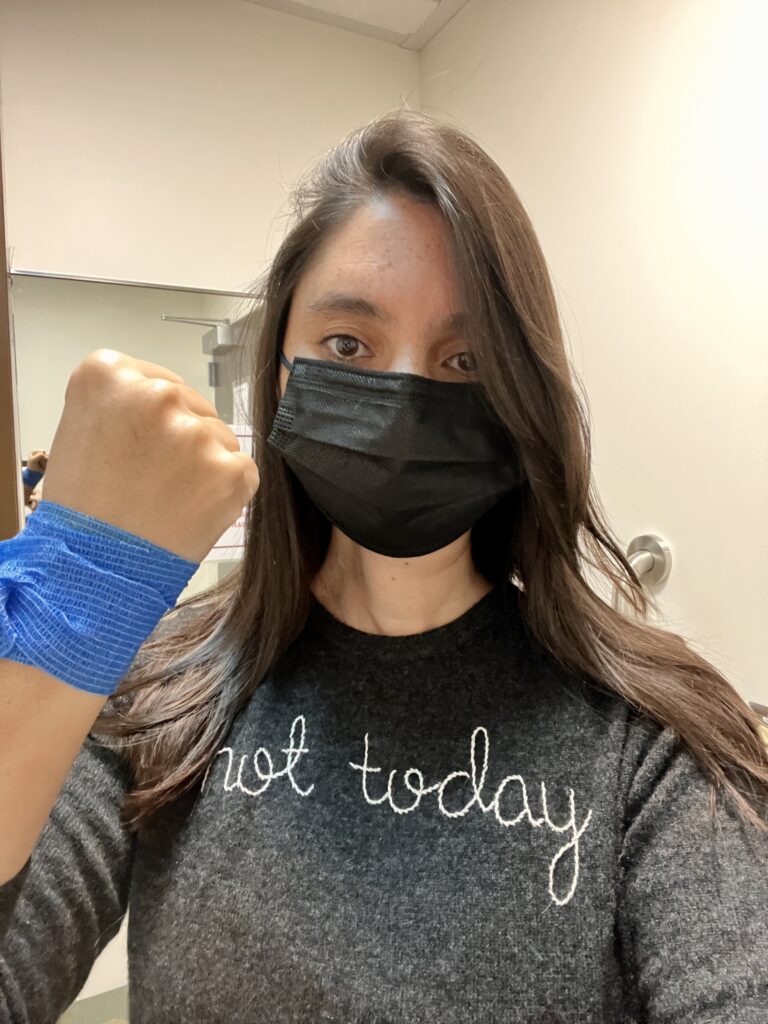
I would feel better on the antibiotic for a little bit after, and then the issues would just come back. Nothing seemed to make them go away permanently. As for my sister, she had done a round of vaccine for her stomach issues and they had just gone away.
I went and saw a GI because I was having trouble finishing going to the bathroom. I would go to the bathroom and I would feel like there was more that needed to come out, but I would have to sit and wait for a little bit for it to come out.
So the GI did an exam and he said, everything seems fine, but, I’d like to do a colonoscopy to rule out Crohn’s or colitis. And then he also did a bacterial overgrowth test.
So I got a call from my insurance that said that he was leaving the network the next week, and that I would have to find a different GI to do the colonoscopy. So I got a new referral to another GI. He looked at everything that the previous GI had done. He said, you have IBS with bacterial overgrowth because I tested positive for SIBO.
Then he wanted me to take an antibiotic every night for 6 months to a year. And what he said to me after that was, this is what I think is wrong with you, and I’m never wrong. I didn’t like that answer.
My work in TV keeps me filming about 8 months a year. Every hiatus in the spring, I would go see another doctor. So I got another referral to another GI. I went and met with her in Santa Monica and she said, I don’t think it’s Crohn’s or colitis, but we can rule it out by doing a colonoscopy. But she also said, well, you aren’t having symptoms right now, so let’s just wait until your symptoms come back. And it was my first time as an adult that I went an entire year without any symptoms.
That all changed on March 1, 2019, when I was at work. I will never forget it.
It was a Friday evening. I was standing in front of the house where we were going to film, and I felt like I had pulled a muscle in my side. And I remember saying to one of my friends at work, like, it feels weird because I didn’t do anything that would have caused that feeling. And from that day onwards, I started getting shooting pains from my left side towards my middle, and they would become more frequent and more painful as the weeks went on.
On March 11th, I was at work and I started to just feel ill as well. I took the next day off and went to see another GI. He did all these different tests, and he noticed that my blood work from January, from my physical, revealed that I had very low B12 and very low albumin, and nobody had followed up to do additional testing.
The GI said, you know, we’re just going to run some tests. I would like to do a colonoscopy. You probably have a mild Crohn’s and colitis. So the same thing that everyone else sort of thought was or wasn’t what I had.
Okay, well, I have a month left of work. Is it possible to do it when that’s when that’s done? And he said, oh yeah, of course, no problem. I said, as long as it’s not life threatening. He said, oh no, nothing like that.
The next day, I woke up in the most pain I’d ever been in—I was in so much pain that I could not stand up straight—and I drove 35 miles to Santa Clarita to go to work. But everyone at work was like, you have to go home.
My doctor called me and he said the inflammation levels in my blood were so high. He said, you have to have a colonoscopy on Friday (this was a Wednesday). I was talking to my parents and my dad, who’s a pediatrician, decided he was going to fly down because of how much pain I was in.
My GI initially had told me to start taking fiber on that Tuesday. And then on Wednesday, when he called me, he said, don’t take fiber, switch to Miralax instead. My first bowel movement post-Miralax on that Thursday was covered in blood, and it was the first time I had ever had blood in my stool.
I reached out to him and he said, that’s perfectly normal. It’s what we would expect because of the levels of inflammation in your blood. I wouldn’t worry about it, he said.
Discovery and Diagnosis
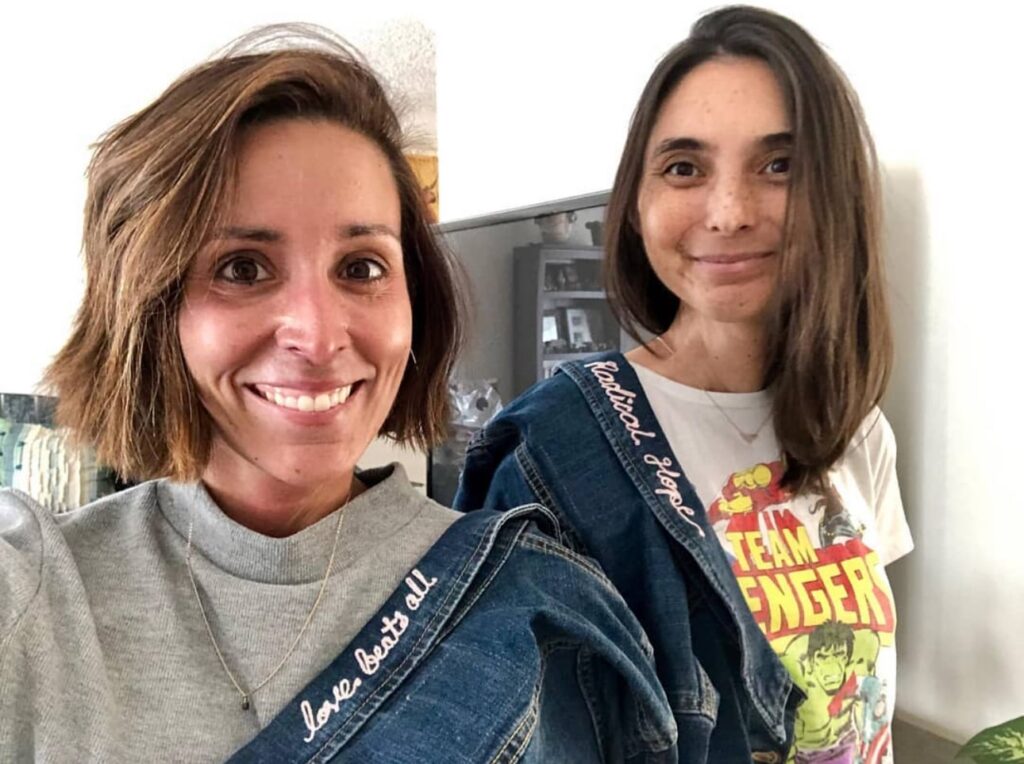
However, my GI and my dad had spoken on the phone and they decided they were going to send me for a CT test. So that Thursday, March 14th, I drove to UCLA to have my CT exam. My dad was flying in and was going to meet me at UCLA.
I had the CT exam, and when I was done, my dad showed up. I was still in pain and extremely nauseous. We drove to Rite Aid to buy something, but I was feeling so bad that I couldn’t leave the car; my dad had to run in.
When I got home I immediately ran into the bathroom and started throwing up. But in the middle of all that, my dad walked in with my cellphone on speakerphone because my doctor had called back.
The doctor says, I’m so sorry, but you have a tumor in your colon and spots on your liver and you have to go to the hospital.
And my dad whispered, it’s happening all over again. Because my mom had non-Hodgkin’s lymphoma of the bowel. It wasn’t connected through cancer, but it was in roughly the same location.
And then my doctor called me back, he was able to get me a bed. Just go to UCLA, he said. I packed and we drove over.
We arrived at UCLA and got settled. The next morning, they brought me in for the colonoscopy.
If you have a blockage in your colon, no matter what stage you’re at, if it’s bad enough, they’ll do an emergency surgery and just take out that part of the colon right away. They were successful and were able to place a stent.
The next day I met Dr. Agopian, who ended up being my liver surgeon. He had a refreshingly different approach from the others I had spoken with. He walked into my room by himself, sat down at the screen, and turned it to face me.
Dr. Agopian pulled up my scan and he said, you have three spots on the left side of your liver and one on the right.
Dr. Agopian said, I want to take out the whole left side of your liver and this spot on the right, it’s right on the edge. We’ll just cut it out. And then he looked at me and he said, let’s cure this thing. And he added, well, we’ll do a few rounds of chemo and then if it’s the same or better, you can have surgery.
Reaction to My Colon Cancer Diagnosis
So after I was first told I had colon cancer and spots on my liver, I remember sitting on the floor and there were a few first thoughts.
My friend Stacy was diagnosed with breast cancer when she was pregnant with twins, and she passed away before they turned two. At their first birthday, she had said to me that she had bone spots. I remember calling my dad and asking him what that meant. My dad had said to me that any time cancer leaves its origin, it’s only a matter of time.
So when he said I had liver spots, my first thought was, oh, I’m going to die. And then my dad left to go call my stepmom. I sat on the floor and my first thought was, this is so stupid. I just was like, I can’t. It just didn’t make any sense.
And then on the way to UCLA, I don’t remember if we really said anything. I remember having conversations with myself, and I was just sort of going through all of the things that I’d done. I’ve traveled a lot. I’ve been to all seven continents, like you’ve lived, you’ve had a really good life.
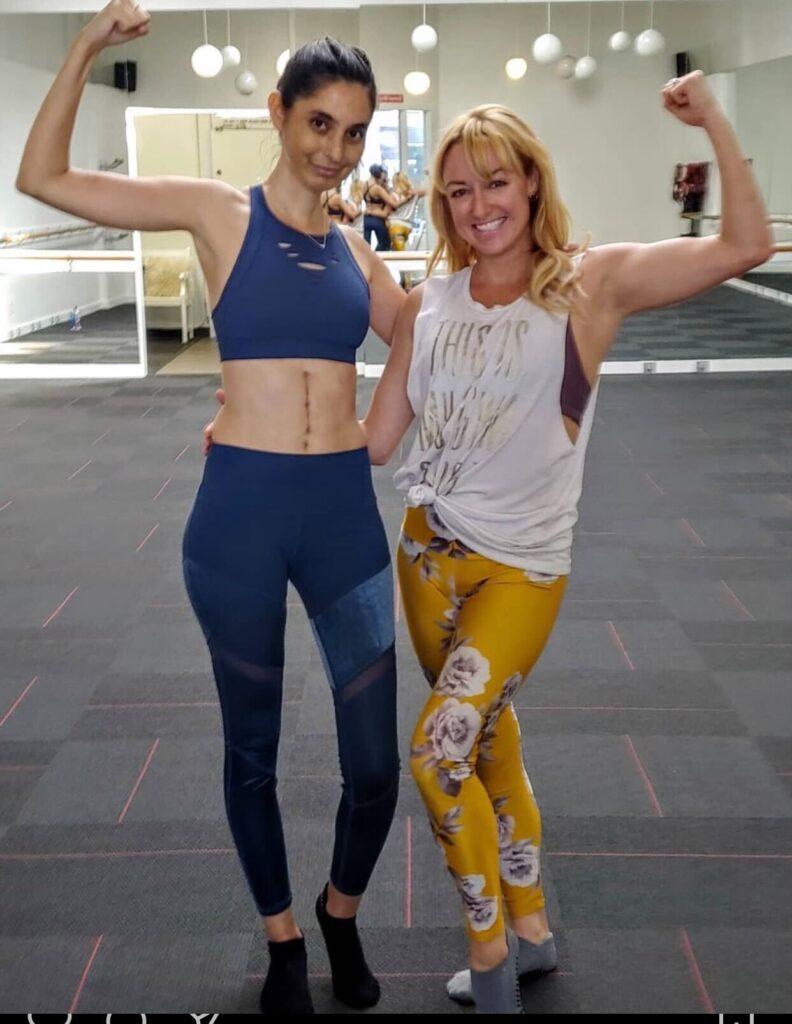
And we get to UCLA and headed to my room. The woman said that they were going to do a biopsy and colonoscopy in the morning, and so they were going to do 3 tap water enemas that night. My dad went to find lodgings for the night and my stepmom was going to fly in the next morning. So I was all alone in the room.
I just remember sitting in that hospital room and basically knowing already that I had stage 4 colon cancer. It’s a very strange thing because no one had confirmed anything yet and I didn’t have a biopsy, but I already knew.
For a period of time, I was explaining what was going on, but the minute that I would have to say I have stage 4 colon cancer, I would just lose it. And so I didn’t tell. A few people, like those from the show that I was working on, showed up in ways that they didn’t have to. They had always been extremely loving and caring towards me.
But Dr. Agopian made a real difference. He was the first person that sat down and explained things in a way that was practical and straightforward. Okay, here’s plan A, here’s plan B, here’s plan C. These are the options. These are the things that we can do. And I felt so disconnected from everything that was going on until this man walked down and just said, this is what’s happening. This is what we’re planning on doing.
He for me was like a light, like a beacon of hope that nobody else presented. And I held on to that so tightly because nobody was giving me anything else.
Treatment
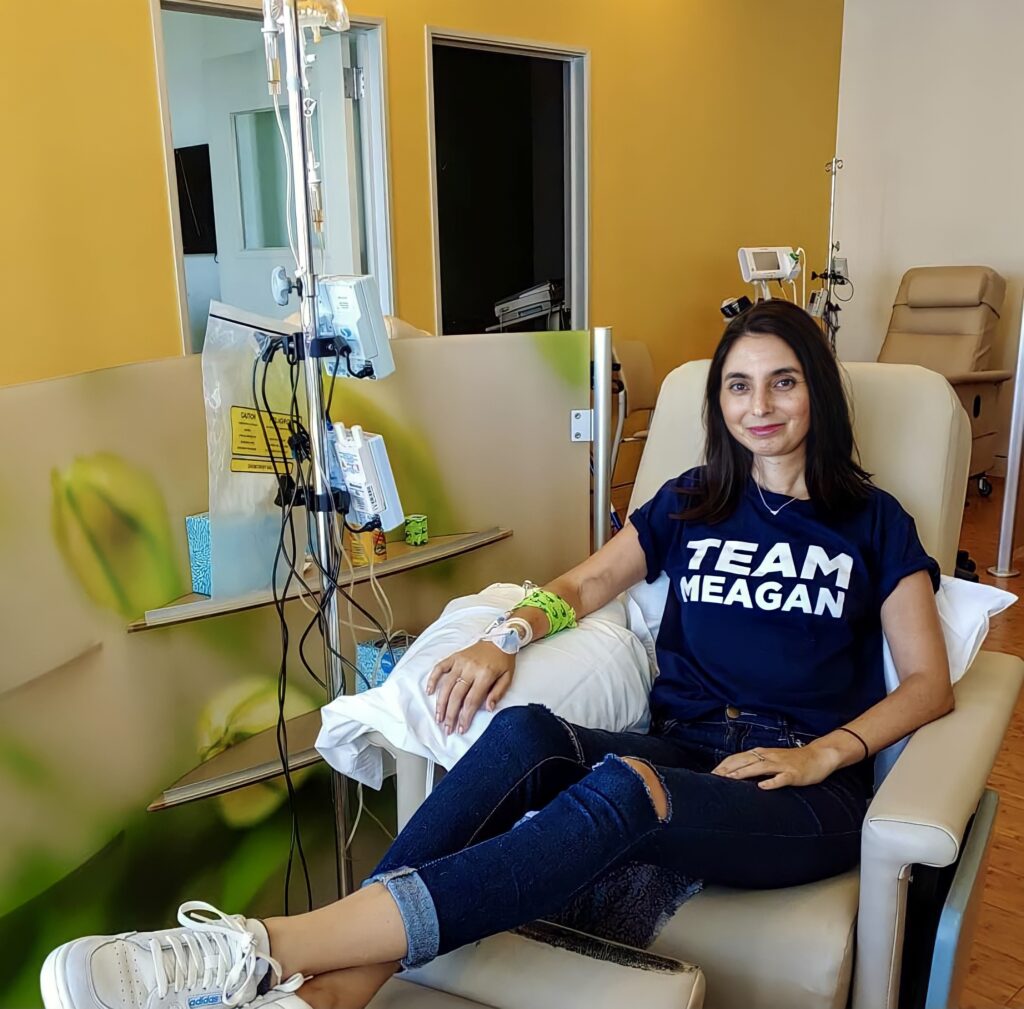
I was in the hospital from Thursday to Sunday. I only stayed in the hospital as long as I did because I kept getting fevers at night. They couldn’t find any infections. They couldn’t figure out what my fever was caused by, either; there wasn’t anything else going on. I basically had to stay until I stopped getting fever.
And then I got better and was released. My parents initially told me to come to Northern California, where they live, because they knew the head of oncology at UCSF and they’re like, you’ll come up and do this at home. But I said, thanks but no, I’m not leaving my house. If I go home to do this, my entire existence revolves around me being sick, away from all of my things and my cat and so on.
So they gave me the names of a few different oncologists and reached out to their friend at UCSF for referrals to UCLA as well. They came back with two of the same three names. And after a couple of initial calls I finally got to talk to an oncologist, and my sister and parents flew down to meet him.
Chemotherapy
I had my first round of chemo on April 2019 and ended in November 2019. I took oxaliplatin and xeloda.
After that, I did a scan. I had been told, if my scans were good, we would cancel the chemo appointment. If they’re bad, then I’d need to stay and do another round of chemo.
And I had asked my doctor because the liver surgeon had said it just has to be the same or better. And I said, how often is it the same or better? He said 75%. I think it was 70 or 75% are the same or better on oxaliplatin and xeloda after three rounds. But I was taken aback when I got a phone call and was told that my appointment had been cancelled, my doctor was taking a leave of absence, and I had to find another doctor while he was gone.
So I paged my nurse practitioner, and I said, well, I want my scan results. And she said, oh, your colon cancer tumor, you can’t even really see it anymore. And all your spots shrank.
I then called the liver surgeon’s office, Dr. Agopian’s office, and was told that he wouldn’t be back until Wednesday. But then I got a phone call back and was told that I was going to have surgery and that I needed to meet Dr. Agopian and my colon surgeon on Friday.
I immediately called my friend who lived in Hawaii, and I scheduled a flight to Hawaii on Saturday, right after the meeting with the doctors, because I wanted to have a bikini vacation before they cut into my stomach.
Surgery
So during the Friday meeting, we scheduled my surgery for July 1st of 2019.
There was an initial concern about the date; my dad went, oh, it’s July 1st. It’s the day in every hospital where everybody moves up a level. A lot of people don’t have surgery on July 1st. But it turns out that none of the doctors assigned to me would be affected, which was great.
I underwent the surgery as planned on July 1, 2019.
Remission
One or two weeks later, I went in for my follow up appointment with Dr. Agopian. He came in and he said, is anyone giving you your pathology yet? I said, no.
And he said, the cancer cells in your tumors, they’re all dead. At that point I’d had 3 rounds of chemo out of the 8 that I was supposed to have, and I just sort of went, oh, okay.
And then a day later, I came in to see my colon cancer surgeon and he walked in and goes, Agopian stole my thunder. And they were like so excited. But again, my oncologist was gone and so I didn’t quite have that conversation.
I went to a new oncologist and he’s going through my file like he hadn’t even looked at it yet. And he was just like, oh, this is good, this is good.
And then he goes, you’re in remission. I called my sister after and I was like, didn’t sink in and it didn’t feel real. And then finally when my oncologist came back and said, you know, they say NED, which is no evidence of disease.
I finished my colon cancer treatment in November of 2019. I dropped the oxaliplatin because I had a allergic reaction on round 6 and broke out into hives. So I just did the xeloda for my last few rounds.
I got scanned every 3 months, and then it went to 4 months. And on July 1st when I go in to see my oncologist, for my 5 year scans, I then get a say in how long we’ll have a discussion of how often we’re going to do the scans versus the Signatera, which is the blood test where they can test for tumor markers in your blood.
… you will not always feel [bad] because in the first round you don’t know when it’s going to end and you feel like it’s never going to end.
Lessons Elizabeth would like to share
Radical Hope
During the course of my treatment, one of her friends had said it was really interesting because she was having conversations with one of her friends who was a doctor, and what the friend had said to her was, there’s no reason not to have radical hope.
So radical hope sort of became my thing.
I’m not religious. I don’t believe in God. But that being said, there is still a sense of whatever happens, happens, and what’s meant to be will happen. So that always gets very complicated for me.
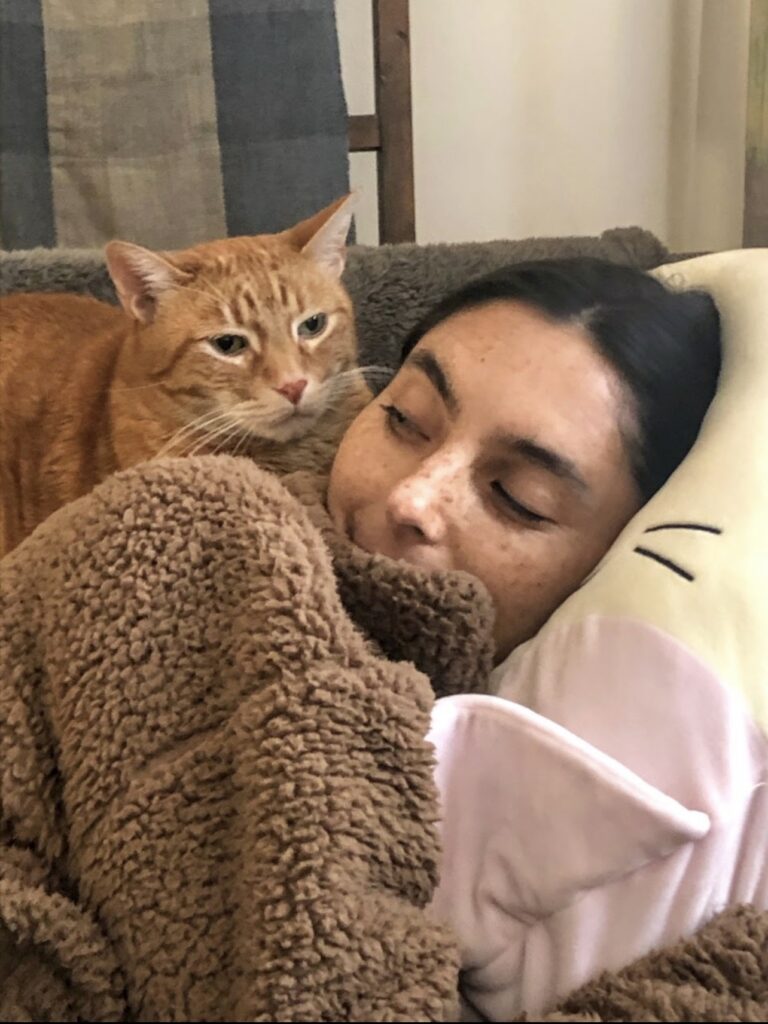
The Possibility of Death
I was just very practical about it. Like most people don’t survive a stage 4 diagnosis. The statistic I think is, 12 or 14% of stage 4 colon cancer patients are alive 5 years after their diagnosis.
If you are a stage 4 cancer patient and you are friends with other stage 4 cancer patients, most of them are going to die. That was a really hard thing to deal with. And then I also struggled a lot because people kept saying things like, you’re the strongest person I know. If anyone can beat it, you can. And every time someone would say that to me, I’d be like, oh, I’m definitely dying.
It’s such a weird pressure because what if I die? Then have I let all these people down? Was I not as strong as they thought I was?
I’m not a warrior. It’s not a battle. It’s a disease. I didn’t sign up for this. I’m not a soldier. I think Norm McDonald said, um, when you die, the cancer dies with you.
I always appreciated that because I think that people mean well, again. But, like, I’m not a warrior. I’m not out fighting. I’m on my couch watching Parks and Recreation, trying not to throw up.
Putting up a strong front
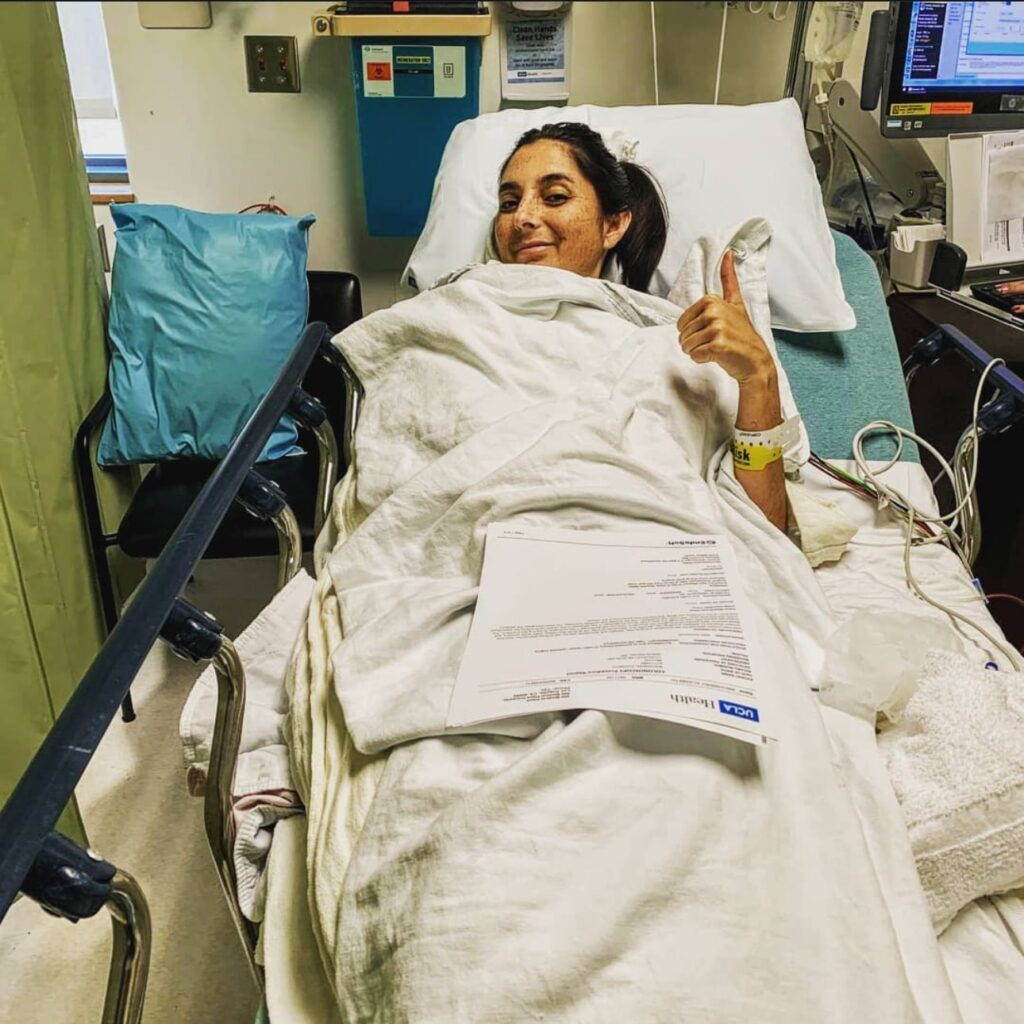
It’s this idea that you have to be this strong front to everybody. And it’s like, no, we’re tired.
Like we’re tired and we’re cranky and we’re annoyed and like, I was so hot and people, very lovely people kept sending me blankets and I was like, I just, I’m so hot. And one of the main side effects of oxaliplatin is that you can’t eat, drink or touch anything cold. I had a very high cold sensitivity, so I was always having to drink hot drinks, hot chocolate, hot apple cider, hot water and lemon.
The last thing that I wanted was to be wrapped up in a blanket. But I really appreciated everybody that sent them to me.
If I am miserable on top of how terrible it is, what’s the point then? So I’m going to try to have the best time, like you’re going to try to make the best out of a bad situation. And it’s hard to do.
But I had incredible people that stepped up and came and took care of me, and there was so much good that I got to experience.
Reaching out, giving back
I recently donated my hair. I did it when I was diagnosed, also because with colon cancer, with the main chemo, you don’t lose your hair. But I was so overwhelmed with all of the love and the gifts and the things that were coming to me. I donated my hair after my first round of chemo, and then just 5 years later, I donated it again.
Any time that I felt like I could give back in any way, that was really important.
People are nice to you because you have cancer. Everyone seemed to go out of their way to offer things. And I think that’s also the other thing, it was really difficult for me to ask for specific things.
So everybody stopped checking in on me and it was like, oh, because everyone said, I don’t want to bother you. And I just would say, it’s not about like telling someone you’re thinking of them or, hey, I’m going to stop by with, you know, X, Y, or Z. I think those are sort of things that are super helpful.
And for me to be able to share as a stage 4 patient, to give hope to other stage 4 patients, that there’s someone in front of them who is going through it, who went through it somewhat recently and is okay. And that can be a little bit of pressure of like, I get nervous that if I do have a recurrence, I’m somehow letting everybody down.
It feels like a very strange space to live in. But again, things like this. I’m so grateful to be able to share my story with other people who will be able to watch this and know that there is a light at the end of the tunnel, or that there are things that they can do to help themselves.
I think that everyone’s experiences are going to be different. The fact that colon cancer is now the number 1 cancer death for men 20 to 40, and it’s the number 1 cancer death for men and women combined 20 to 40. And we still aren’t doing colonoscopies for people. I think that that’s the big thing that needs to be addressed.
Access to colonoscopies, access to Cologuard, access to things that are clearly needed because the number of people that reach out to me, women in their 20s on Tech Talk who will message me and say, I made my doctor do a colonoscopy, they said they weren’t going to find anything. They did a colonoscopy. They removed precancerous polyps and they said, you saved my life. And I think that the price of a colonoscopy, the access to health care, all of these things, it’s going to cause so much more issues because the number is rising. It’s something environmental. My geneticist says they don’t know what it is.
And for people that were born in the 80s and 90s, I just think that access to colonoscopies needs to be a bigger thing on everybody’s mind. I will also say that I did call my doctor’s office of the gentleman who said, this is what I think is wrong with you, and I’m never wrong. I spoke to the office manager because I wanted to make sure that he knew that he was wrong.
Mental health struggles
The big thing that people don’t sort of warn you about is that everyone’s around you and it’s very structured. And then once you finish, you don’t have that anymore. And that to me is when my mental health tanked.
I really struggled as my friends were starting to pass away from treatment, being a former stage 4 cancer patient who doesn’t have cancer any longer. But maybe it’s Schrodinger’s cancer, right? You don’t know until the day you have the test and the day you have the test. You know that that day you didn’t have cancer. That can be very difficult.
I started to have panic attacks and had to stop working on the show that I was working on because my mental health got so bad. Actually, I had a panic attack so bad I couldn’t drive for about six weeks. I didn’t think I’d be able to work again.
My primary care doctor at the time wouldn’t prescribe me anti-anxiety meds. He wanted me to rule out anything medical. So I went through endocrinology, ENT, cardiology, neurology. I had a brain MRI to make sure I didn’t have cancer in my brain. I saw every doctor under the sun. But the problem is, they were all specialty. They come in, they do their test, and if it’s not them, they just leave. So I was just constantly feeling abandoned by all of my doctors and my primary care doctors.
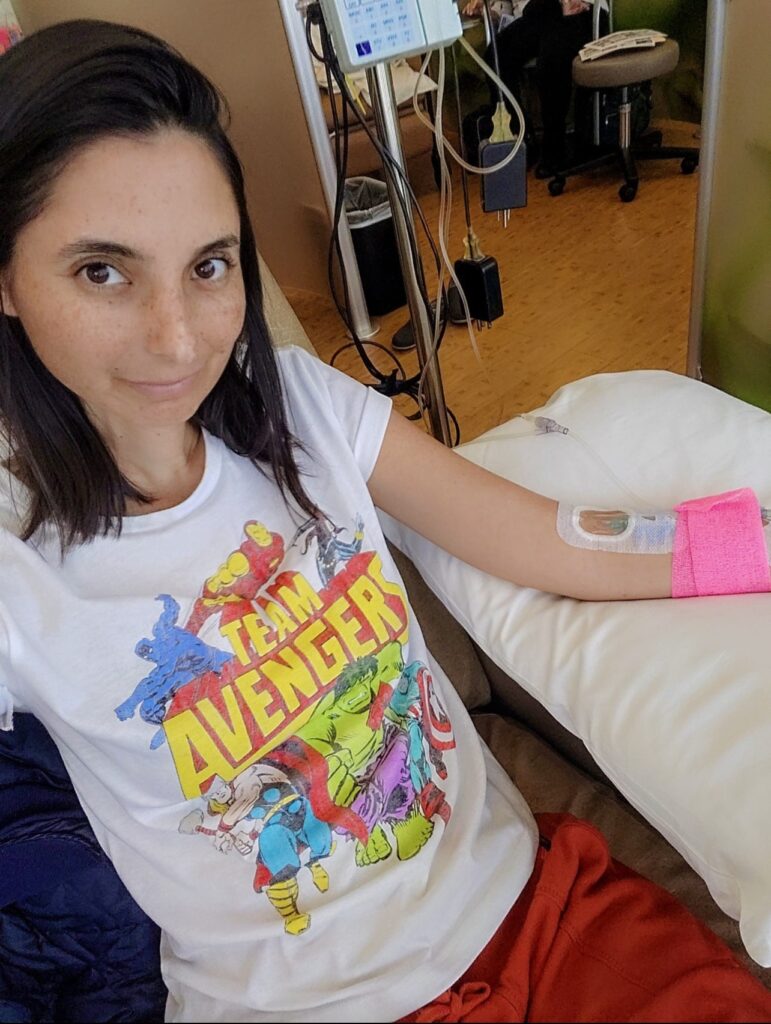
And then finally I made it through all the different doctors. I was feeling suicidal and was really struggling. It was really upsetting that no one was sort of listening or paying attention and feeling really guilty because I survived. I couldn’t live the way that I was feeling, the way that my brain felt. I couldn’t sustain that and I felt like nobody was paying attention. To anything other than their specialized thing. And so I had guilt on top of everything else. My brain just felt like it was fighting me all the time.
And the mental health aspect of chemo as well, which my friend Megan called black cloud days when you were having a bad day. I was talking to someone and I kept saying, it’s okay to have a black cloud day. And her husband kept saying, but we’re always going to look for the sun. And I was like, but you have to allow yourself to sit in what feels bad sometimes.
The better we felt, the worse we felt mentally during our cycles, because the better you felt physically, the closer you were to going back and having another round. You physically felt better, you were able to do more things, but you knew that the better you felt, the worse you were about to feel. And so I think that the structure of how you can help somebody who’s going through chemo and everybody is going to need something different.
Resources that can help
I think that whatever little thing you can hang on to and help you find your people, you should explore.
ColonTown is a great resource on Facebook. And TikTok has become another big thing for me. I created a TikTok account to spread awareness for colon cancer and young people, but also the idea of struggling with mental health after your cancer finishes because nobody talks about it. There isn’t as much support for that. There’s support when you’re going through it.
UCLA has free psychiatry, psychology services. You can get a therapist, and I had a great one. Not enough attention is paid to your mental state after your treatments are finished. And so that’s always been a really big thing for me, which is, people say, oh, but you’re better now. And it’s like, you’re never fully better. It never goes away.
I should also say that I craved oranges, and I learned later that oranges are an anti-nausea food, and pregnant women drink them and people on boats when they’re getting seasick.
Solutions
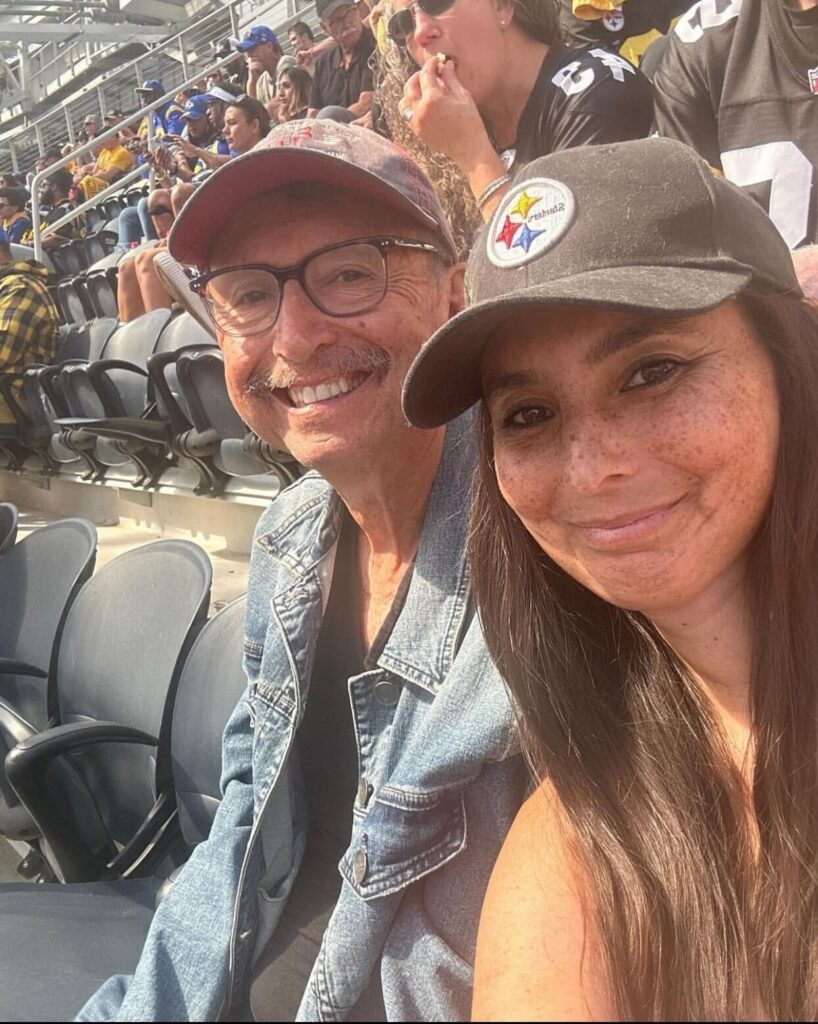
I had a meeting with a psychiatrist who I just saw to prescribe me meds that I should have been given six weeks earlier. And within two weeks it completely changed everything in my life. And I also now have a new primary care doctor who is lovely.
I’m wearing my Chadwick Boseman T shirt. It’s all of the lost potential of a human being that colon cancer took away. Like colon cancer took away massive potential not only from Chadwick himself, but from every person that that passes away.
And I think that the struggle of having cancer, of dealing with cancer, and then dealing with its aftermath is something that is really important, and I would love to figure out a better way to sort of platform all of that.
I’m going on a beach vacation with my sister and her friends, next week to celebrate five years, I have my scans on the 28th.
I’ll meet with my oncologist on the first, and it all seems like a fever dream, because when you first get diagnosed and when you’re in it, it feels so far away.
“Snowboarding”
When I went in for my first round of chemo, I sat next to a man who was a couple years older than me. His colon cancer had spread to his esophagus. And I was so scared and so unsure of what was coming and what to expect. And he was on his 5th round.
He sat there and walked me through everything that I could expect. He talked about the cold symptom called broken glass syndrome. If you eat or drink anything, even walking too quickly, the air that you inhale is too cold and it can set off different things. He just talked me through everything in such a gentle, sweet way.
I have shared with every single person that I have talked to about this because a lot of people reach out on TikTok or on Instagram, I have many conversations with strangers who have just been diagnosed, or have friends or family that have just been diagnosed, and I walk them through everything like he did for me.
What he said was, on my good weeks, I go snowboarding. And so in my first round when I was having my worst day and I felt like I couldn’t do anything and I couldn’t move, and I felt so terrible in my head, I just kept repeating, he went snowboarding.
He did not go snowboarding feeling like this. So you will not always feel like this because in the first round you don’t know when it’s going to end and you feel like it’s never going to end. And so I just kept saying in my head, he went snowboarding. And that to me was the hope that I would get better.

Inspired by Elizabeth's story?
Share your story, too!
Related Cancer Stories
More Colon Cancer Stories
Briana H., Colorectal Cancer, Stage 3
Symptoms: Periods of constipation initially lasting one week and then extending to two weeks, nausea, pain in lower left abdomen, lack of appetite, vomiting and inability to keep fluids down
Treatments: Surgeries (colon resection, tumor removal, colostomy placement, colostomy reversal), chemotherapy
Kailee O., Colorectal Cancer, Stage 4 (Metastatic)
Symptoms: Sensitive stomach sometimes leading to vomiting after eating, bleeding during bowel movements, persistent fatigue, back pain, abdominal pain, anemia, significant symptom flare-up during second pregnancy
Treatments: Surgery (colectomy), chemotherapy, targeted therapy
Starr S., Colon Cancer, Stage 4 (Metastatic)
Symptom: Abdominal pain
Treatments: Chemotherapy, surgeries (colectomy, hepatectomy, lymphadenectomy), targeted therapy
Jackson L., BRAF Mutation Colon Cancer, Stage 4
Symptoms: Severe stomach pain, fatigue, lack of motivation, anemia, blood in stool, thinning stool
Treatments: Surgeries (emergency bowel obstruction surgery with temporary colostomy, possibility of HIPEC in 2026), chemotherapy, immunotherapy
Heather C., Colon Cancer, Stage 4 (Metastatic)
Symptoms: Severe bloating, indigestion, vomiting, rectal bleeding
Treatments: Chemotherapy, surgery (liver transplant, upcoming)
Nicole S., Colon Cancer, Stage 3
Symptoms: Dull lower abdominal pain that sharpened and was focused on the lower left side, appearance of dark blood in stool, difficulty retaining food due to near-complete blockage of sigmoid colon
Treatments: Surgery (colectomy), chemotherapy
